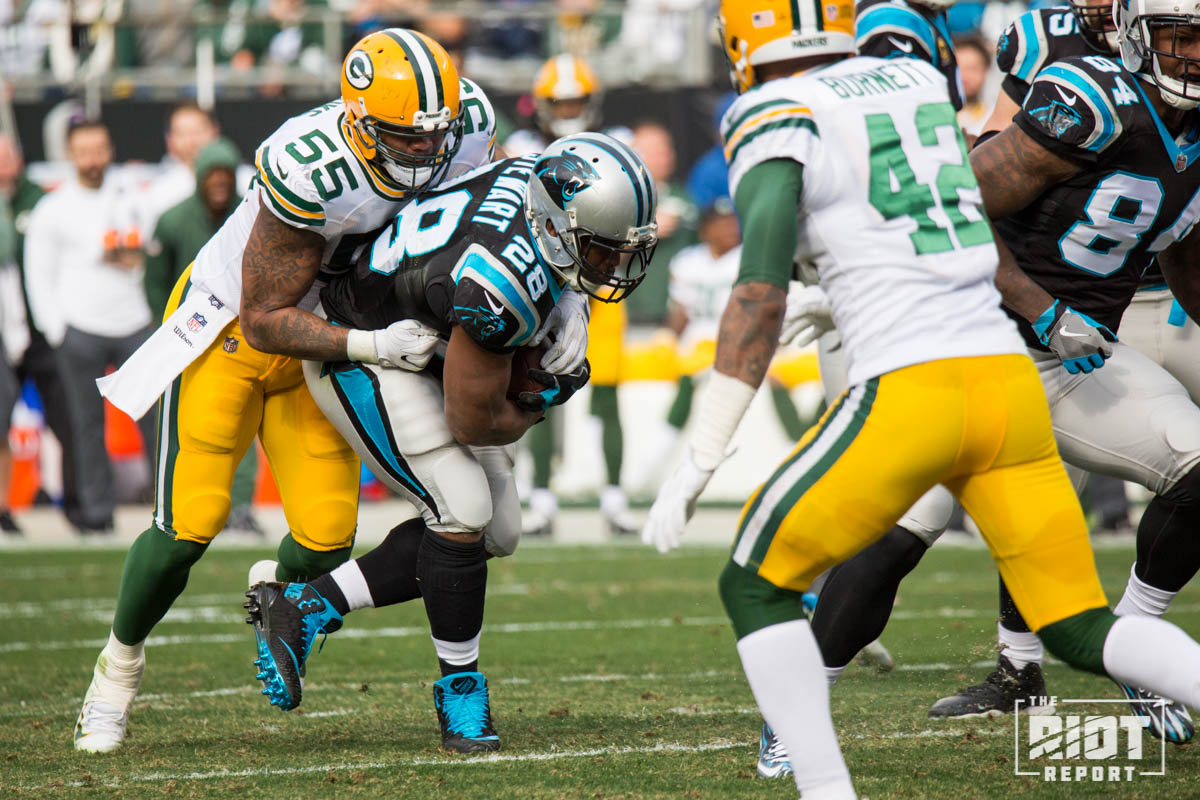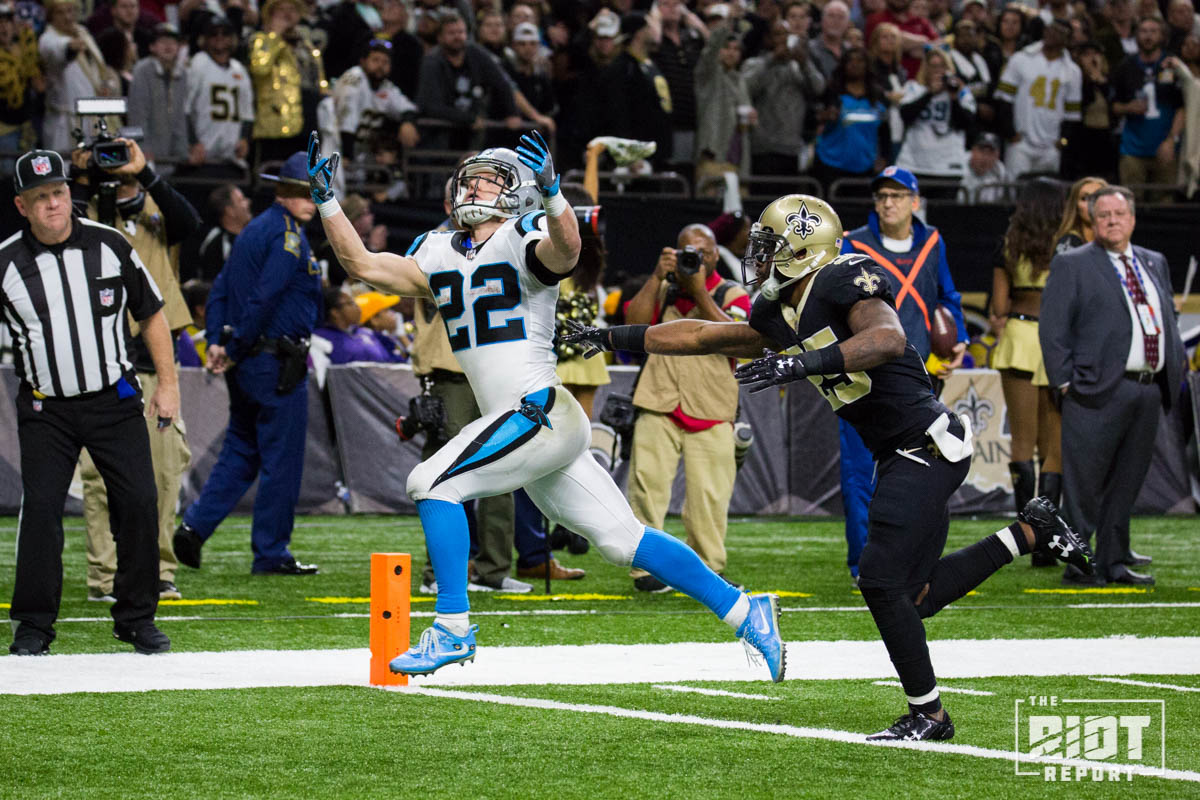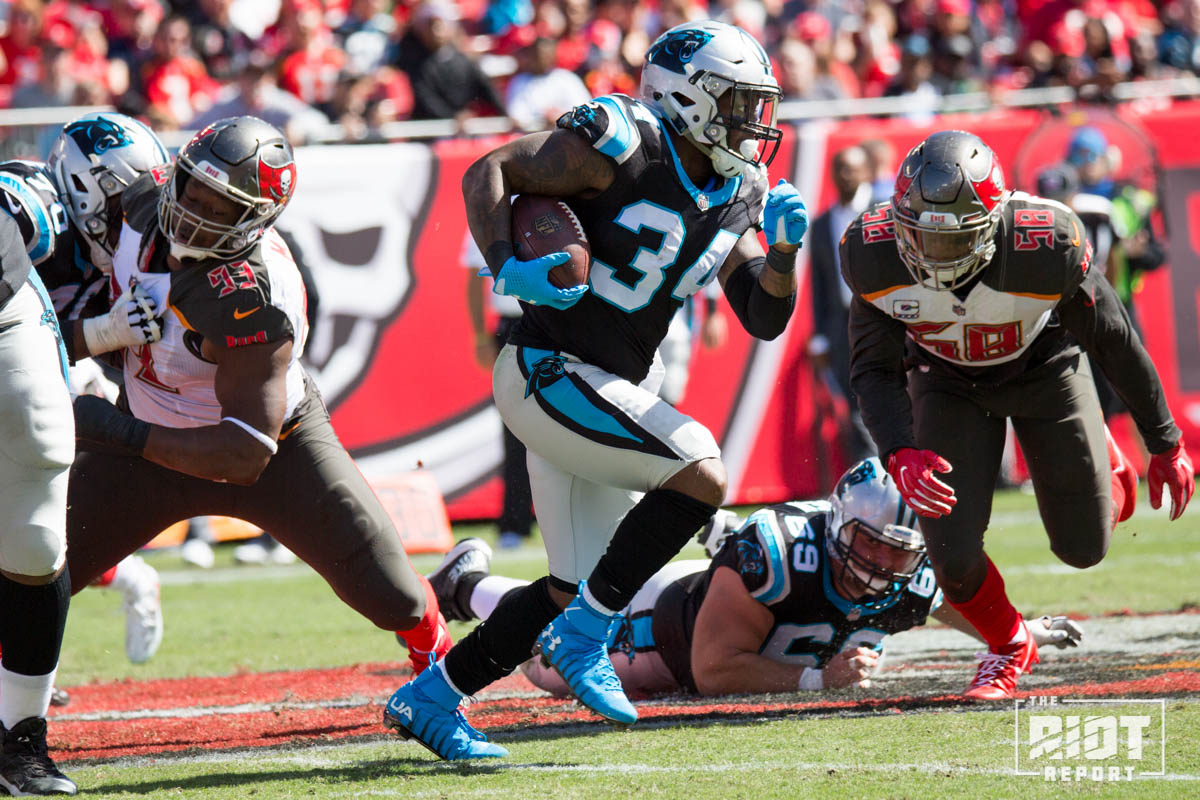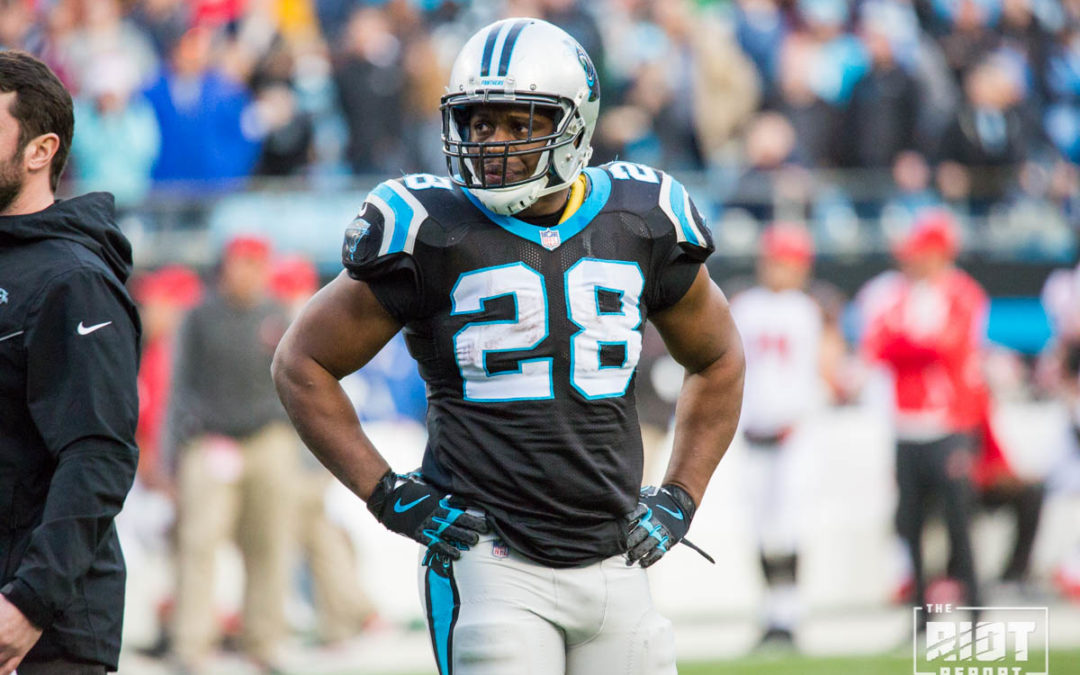Welcome to our offseason series detailing the Panthers offseason needs and how they might address them. Be it through the draft, free agency, or the answer being “on the roster”, the Panthers will need to fill holes all across their roster to field a full 53 heading into 2018. No matter how set the Panthers may seem at a position, there is no reason why the Panthers can’t constantly get better; that will start with an open and honest evaluation of who is on the roster currently, how they performed in 2017 and whether those players will be returning.
Previously, on “Evaluating The Cupboard”:
- Quarterbacks: Will Derek Anderson be back? Is Garrett Gilbert the future backup?
- Wide Receivers: Is a trio of Devin Funchess, Curtis Samuel and Damiere Byrd enough? Or is it just a good start?
The Panthers under Ron Rivera have placed significant emphasis on being able to run the ball; in that regard, the 2017 season has been one of significant highs and significant lows. Even with three games under 80 yards on the ground and an eight carries for -4 yards performance from Jonathan Stewart. the Panthers were 11-2 when they outrushed their opponents in 2017, a statistic that Rivera consistently cites as how important the ground attack will be in 2018. But what does that mean for the Panthers’ running backs currently on the roster?
The Old Guard

Jonathan Stewart had arguably his worst statistical season in 2017, averaging just 3.4 yards per carry; while he did have decent performances in games against the New Orleans Saints as well as against both Miami and New England, at 30 years old, he is certainly beginning to decline. Where he still has value is in the red zone and on short-yardage carries where his power adds something that is otherwise missing from the Panthers’ roster; Stewart had seven touchdowns in 2017 and five of them came from less than two yards out.
What works against Stewart is that he will start next season aged 31 and that his receiving ability significantly limits what the offense can do with him on the field; perhaps most importantly, the Panthers can save $3.7 million by releasing him. This is especially true on long third downs when the Panthers are either forced to take Stewart off the field or use him in pass protection, which in turn, gives the defense a numbers advantage in coverage. Of course, there are few running backs that are the receiving threat that McCaffrey is coming out of the backfield, but when a running back cannot be trusted to catch the ball on a consistent basis, it is hard to view them as a major piece in an offense.
Should the Panthers want to keep Stewart on the roster, that cap savings probably isn’t enough to force him out. If he is deemed expendable, the Panthers are not in a position to be nostalgic; 2018 looks to be a deep running back class and Stewart’s position on the Panthers’ roster is looking somewhat precarious, especially if Hurney finds his replacement through the draft.
After all, in the modern NFL, you can get an awful lot of running back for $3.7 million; Stewart’s 2018 cap hit will be the 11th largest in the league, sandwiched between Marshawn Lynch and Devonta Freeman, both of whom averaged over four yards per carry last season.
Fozzy Whittaker is another player who is facing a precarious future with the Panthers. Whittaker will be 29 when the season starts, touched the ball just 12 times for 65 yards and a touchdown this season, and missed multiple 2017 games with an injury; the Panthers can save $1.15 million by letting him go. Whittaker’s ability on special teams kept him on the active roster for much of this season, but with McCaffrey almost entirely taking over Whittaker’s role on the offense, it is hard to justify saving a roster spot for him, especially if Samuel or Byrd can replace him on special teams.
If the Panthers do release either or both of these veterans, it isn’t out of the question that they could resign either for a lower price, as they have done in the past with Charles Johnson. In a ideal world, the Panthers would keep both, as both do have value; whether that value amounts to nearly $5 million is another question entirely.
The New Guy

Christian McCaffrey was drafted eighth overall to be a significant piece of the Panthers’ offense. Having carried the ball or been targeted 230 times this season, he has certainly been a central figure; his 1,086 yards and seven touchdowns have certainly been valuable. While the Panthers appear to still be working out the most effective way of using their new toy, it is promising that they appear to be making progress in terms of utilization. Having averaged just 2.4 yards per carry throughout the first half of the season, the second half of the season saw him post a far-healthier 4.7 yards per carry. Weeks nine through sixteen helped propel McCaffrey to being one of five finalists for the Pepsi Rookie of the Year award; if the Panthers can roll that success over to next season, they could well get the production out of him that his draft status warrants.
A major factor in doing this has been a greater focus on using his acceleration on read-option plays to get him downhill in space as quickly as possible. Given his inability to garner many yards after contact, maximizing his progress before contact is going to be crucial to his continued success. Where McCaffrey is especially valuable, however, is as a receiver; his route running, either from the backfield or from the slot, is as good as any receiver on the roster and his change of speeds have allowed him to get open at will underneath. Where the Panthers need to be careful is in not forcing him the ball; if used well, he can be extremely valuable but as with Kelvin Benjamin in the past, trying to force him the ball could cause the entire offense to stutter.
Apart from his lack of power as a runner, the other weakness in his game has been his pass protection; this shouldn’t be a surprise given his stature. While running backs often improve in this area over time, part of the plan for McCaffrey going forward has to involve maximizing his usage as a receiver and not taking that away by making him pass protect. McCaffrey could be a major piece in the Panthers’ offensive success going forward, but getting the most out of him will be as much about realizing what he can’t do as what he can.
The Other Guy

Cameron Artis-Payne has averaged over four yards per carry every season of his career and has caught every pass thrown to him as a professional. That’s the good news. The bad news: He will start next season as a 28-year-old running back in a contract year with under 500 yards of total offense in his career and just 23 games played. While his value on special teams combined with his good play when called upon is likely more valuable than the $700,000 the Panthers can save by cutting him, it is hard to imagine the Panthers turning to him as the future replacement for Jonathan Stewart should Stewart be released. If it hasn’t happened already for Artis-Payne, it may never happen.
Outlook
McCaffrey is certain to be a significant feature of the Panthers’ offense going forward, but salary cap imperatives will likely make the future for the rest of the Panthers’ running backs somewhat less clear. If the Panthers can free up enough cap room through redistributing money in other players’ contracts, all of the above could be back next year. However, given his limited role in the offense this year, Fozzy Whittaker will likely be one of the first to be cut; Stewart could be a target for a cut-and-resign, if not just a cap casualty altogether. Should they believe they are getting a bargain, the Panthers might look to add a running back in free agency but it is more likely that they look to make the most of a deep running back draft class to add Stewart’s replacement, either eventual or immediate.



